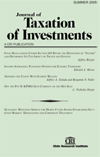Has the United States Really Changed From a Worldwide to a Territorial Tax System?
Author: James G.S. Yang.; Richard A. Lord.; Yoshie Saito.
Source: Volume 36, Number 04, Summer 2019 , pp.69-83(15)

< previous article |next article > |return to table of contents
Abstract:
The Tax Cuts and Jobs Act of 2017 (TCJA) made significant alterations to United States tax policy. It replaced the progressive corporate tax code, which had a top rate of 35 percent, with a flat tax of 21 percent. This brings American corporate tax structure more into line with other developed economies. It also supposedly changed the U.S. system from a “worldwide tax system” to a “territorial tax system.” This change was prompted by the many ill effects that arose under the worldwide system, such as shifting income from one country to another, and corporate inversions. This article describes the advantages of a territorial tax system (tax-free treatment of foreign-source income will do a great deal to encourage the repatriation of dividends to the U.S.) and discusses the treatment of earnings and profits (E&P) accumulated in previous years, and E&P earned after the implementation of the new system. The TCJA treats accumulated E&P differently depending on whether the E&P is held in the form of a cash position or non-cash position. The authors provide an example to demonstrate how the tax liability is determined for the various types of earnings. Under the TCJA, the current earnings repatriated to the U.S. as dividends are not taxed, but a capital gains tax is levied on the undistributed E&P at the time of disposition of the investment. Therefore, in the authors’ view, the U.S. has not completely changed from a worldwide tax system to a pure territorial tax system.Keywords: Tax Cuts and Jobs Act of 2017, worldwide tax system, territorial tax system, current earnings and profits, accumulated earnings and profits, dividend-received deduction, corporate inversion, income shifting, base erosion, transfer pricing
Affiliations:
1: Montclair State University; 2: Montclair State University; 3: Brooklyn College.